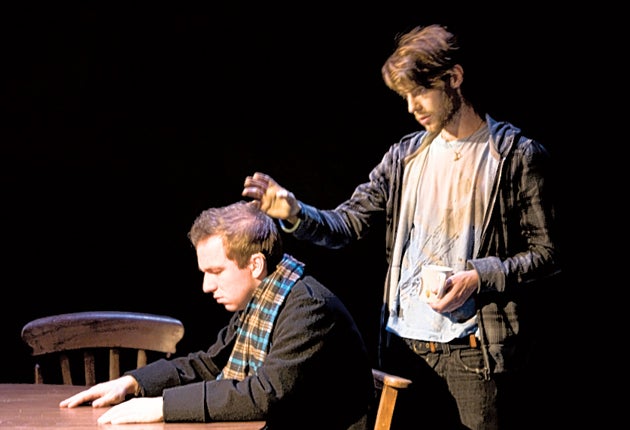Tribes, Royal Court Theatre, London

Nina Raine picked up a couple of "Most Promising Dramatist" awards for her 2006 play Rabbit. She amply fulfils that promise now with Tribes, a fiercely intelligent, caustically funny and emotionally wrenching piece about communication, belonging, and identity. It focuses on Billy (excellent Jacob Casselden), a young man who was born deaf and has been brought up as a lip-reader. Back home from university, he struggles to get a word in edgeways in a household of bickering egotists headed by Stanley Townsend's exuberantly non-PC writer-father and including two fractiously frustrated, unemployed siblings – an aspiring academic (Harry Treadaway) and a wannabe opera-singer (Phoebe Waller-Bridge).
Liberation seems to beckon when Billy meets Sylvia (superlatively played by Michelle Terry) who is going deaf. As the child of deaf parents, she is proficient at signing and she introduces Billy to "the deaf community", the very idea of which is contemptuously dismissed by his father, who thinks that to define oneself by a disability is tantamount to "basing your identity on coming from Gateshead". The brilliant, painfully ironic twist is that Billy becomes a born-again militant, rejecting both speech and family, at the precise time that Sylvia is beginning to resist the hierarchical community with its snobberies (only those deaf from birth are truly kosher) and its ideologically driven failures of empathy (you aren't allowed to mourn, as Sylvia does, the loss of any residual hearing).
There's both a witty and a heartbreaking candour in Terry's sensitive portrayal as we see when Sylvia flutteringly demonstrates the expressive beauty of sign language by translating a passage from Paradise Lost, or when she's reluctantly forced to interpret Billy's dogmatically signed outburst of rebuke for the benefit of his appalled family, or when she grieves for the once normal voice that is now getting flatter and for the irony she can no longer communicate.
The play is astute about the nature of tribes. Given its private jokes, incestuous squabbling and arrogant dismissal of outsiders, you can see why Billy is stung to declare that "if anywhere is a closed bloody ghetto it's this bloody house." I'm unsure, though, about the plot development whereby Billy, having become a forensic lip-reader for the Crown Prosecution Service, is accused of relying too much on intuitive guess-work to the extent of fabricating the evidence. It's not that the idea is far-fetched; I just don't think it psychologically likely in his case.
Tribes unfolds in a dramatically incisive mix of speech and sign language, the latter projected in words on an upstage gauze. Most piercing, though, are those moments of surtitled silence, as in the gestures of love between Billy and his mentally troubled brother that bring home the eloquence of what is left unsaid. These give the lie to the father's smugly aggressive scepticism ("how can you feel a feeling unless you have a word for it?") and tacitly establish that it's hyper-articulacy that can sometimes be the real handicap.
To 13 November (020 7565 5000)
Join our commenting forum
Join thought-provoking conversations, follow other Independent readers and see their replies
Comments